This easy-to-follow recipe features a whole beef tenderloin seared to golden brown, seasoned to perfection, and finished in an oven.
With a tender texture and rich flavors, roast beef tenderloin steaks will surely be the highlight of any special occasion or elegant dinner party.
Whole Beef Tenderloin Recipe

5 THINGS TO LOVE ABOUT BEEF TENDERLOIN
- Beef tenderloin is THE most prized cut of beef and is buttery in flavor and ultra-tender in texture.
- Cook tenderloin as a whole muscle (like a roast) or sliced into steaks, also known as filets.
- Whether served as a whole roast or as filets (steaks), beef tenderloin has a stunning presentation.
- Beef tenderloin is super EASY to cook and serve.
- Beef tenderloin has no bones, so you can eat the entire piece of meat.
INGREDIENTS NEEDED
- Beef tenderloin roast, trimmed only if needed
- Kosher salt and black pepper
- Olive oil
- Unsalted butter
- Fresh garlic
- Fresh rosemary is optional, but recommended
- Fresh thyme is optional but recommended
Best way to cook beef tenderloin
Remove the beef tenderloin from the fridge and unwrap it.
If there is any excess fat on the beef tenderloin, use a sharp knife to trim it away.
Tie the roast with kitchen string to hold its shape. This also makes it more compact and elongated in size/shape.
Trimming fat and tying off a roast are jobs your butcher can do for you. You’ll have to request this of them.

Pat any excess moisture from the exterior of the roast, then season it on all sides with the salt and pepper.
Let the roast rest, uncovered, on the counter to come to room temperature before cooking, 2 – 2 1/2 hours.
Please don’t skip this step! This time out of refrigeration allows the beef to rest and relax so it cooks way more easily and evenly.
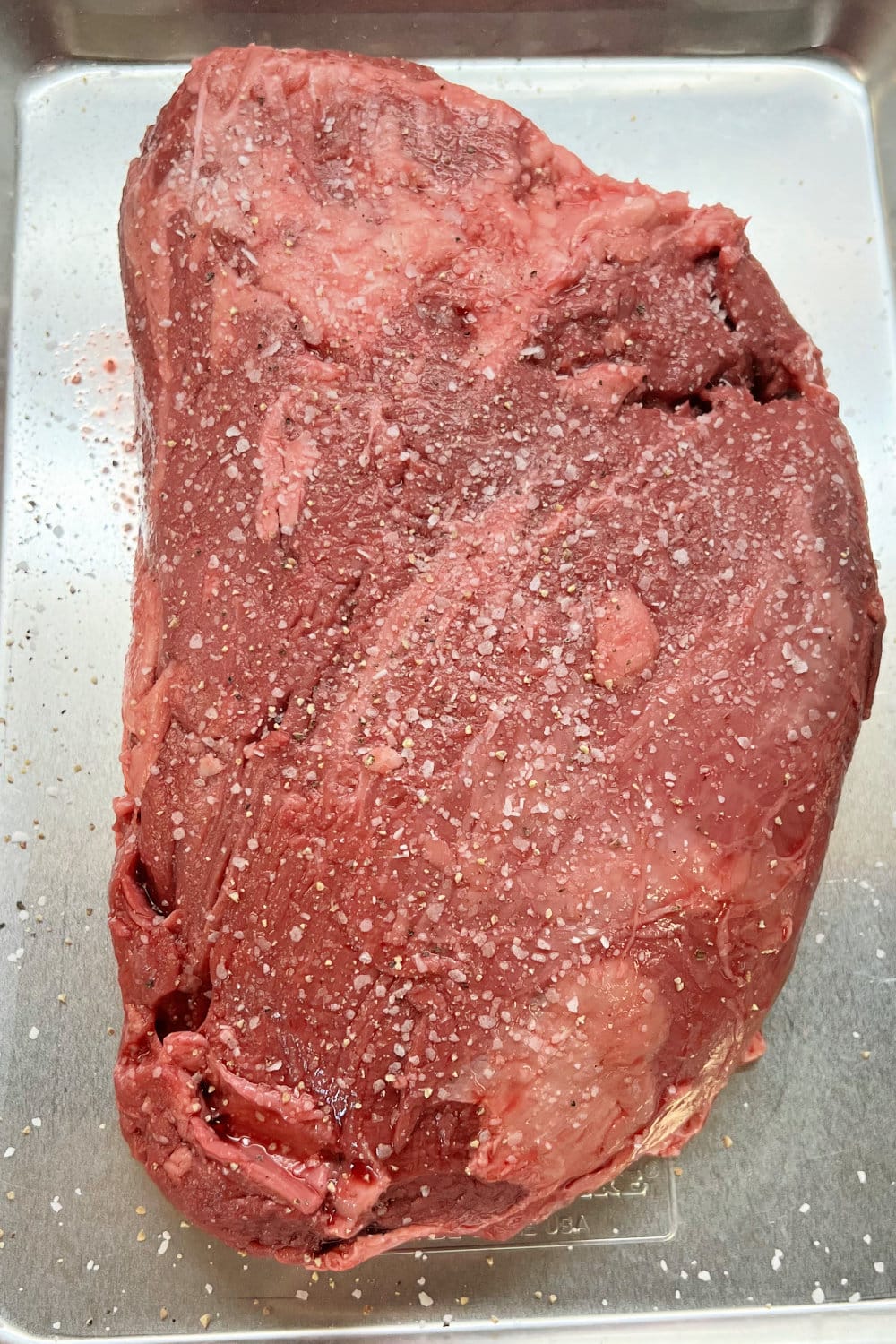
In a small bowl, mix the butter and garlic until smooth; fold in the fresh herbs; reserve.
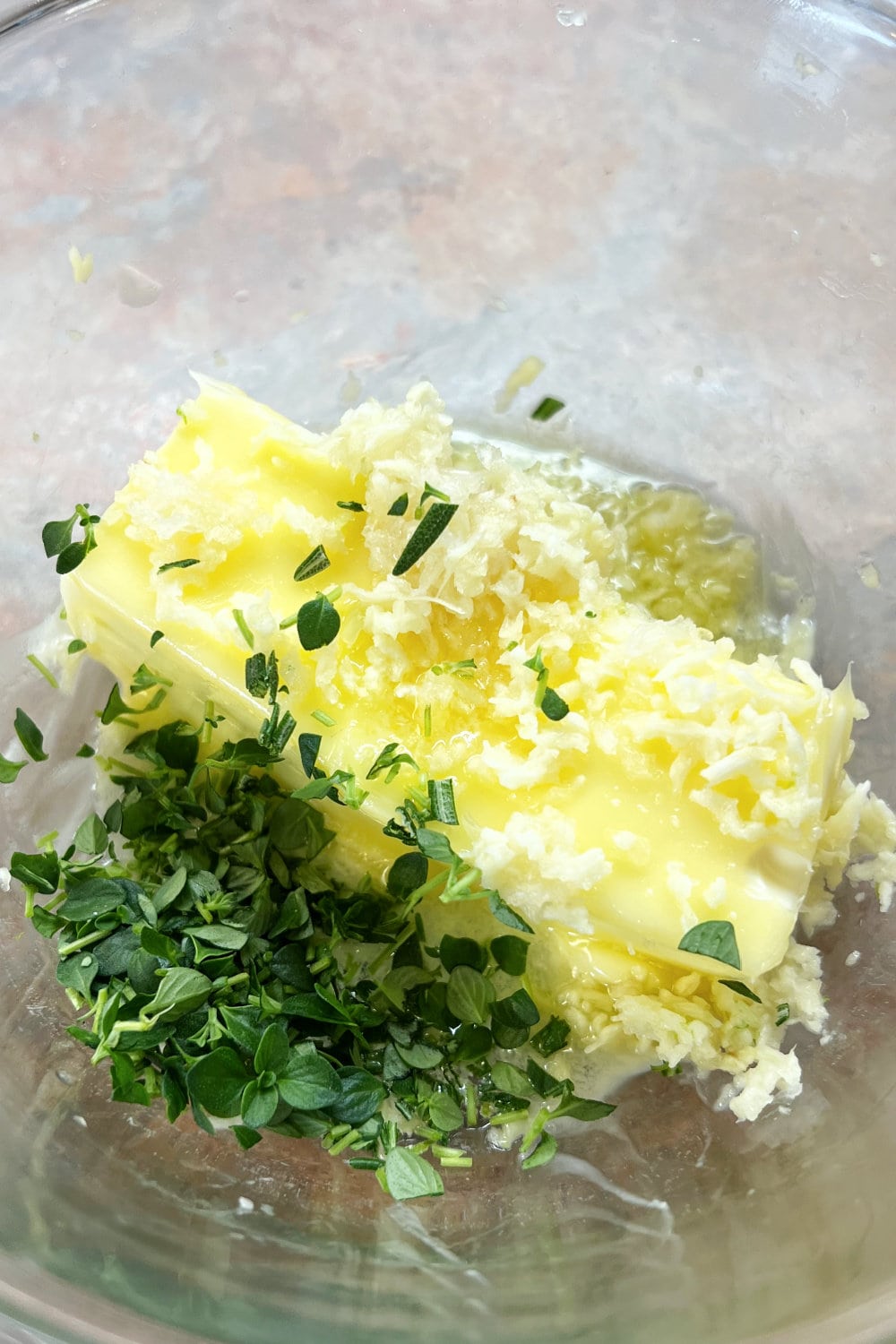
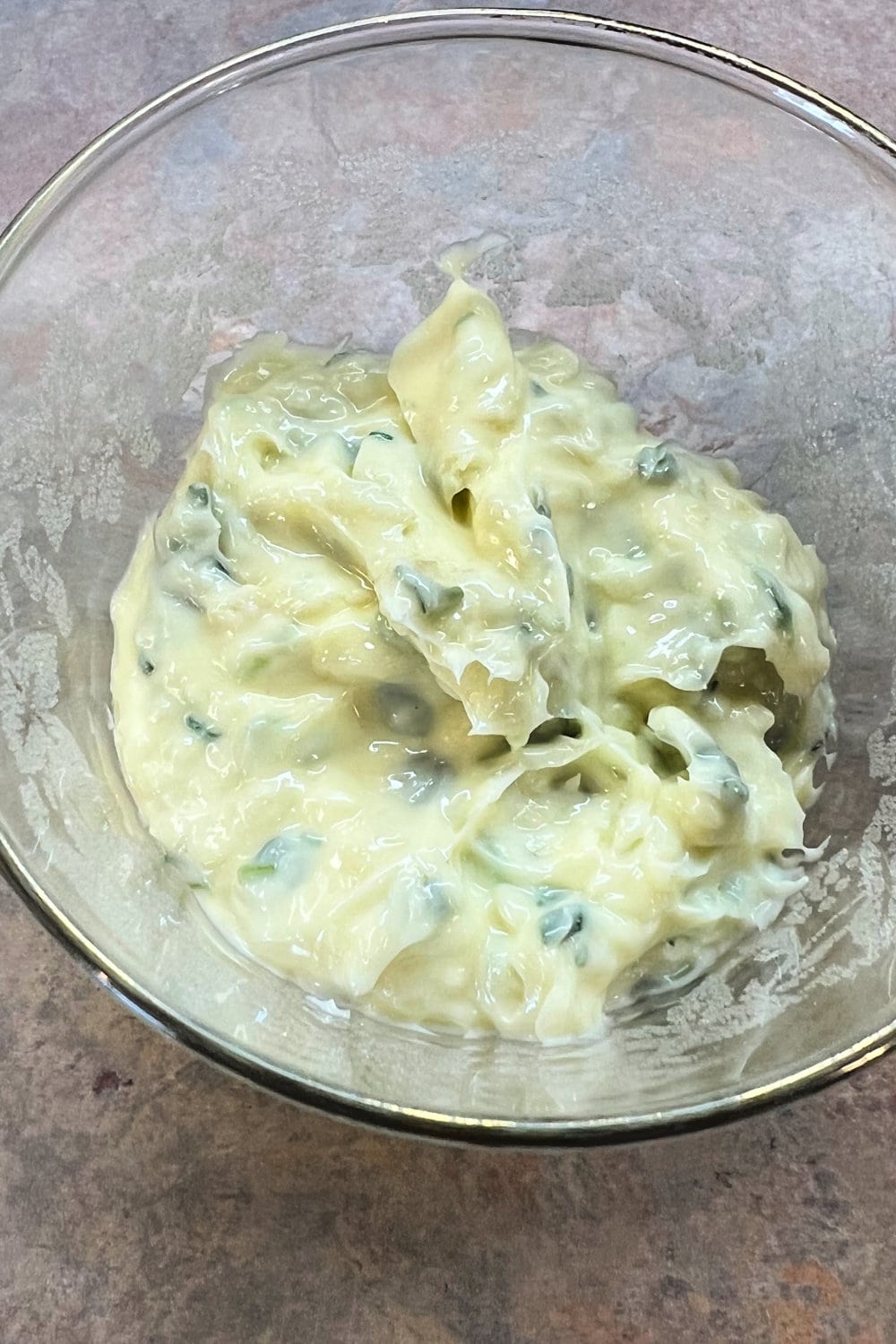
Preheat the oven to 425°F. Add a generous swish of olive oil in a large heavy-bottomed skillet over medium-high heat. I like to use my 1-inch Lodge cast iron skillet for this.
When the oil is hot and shimmering, place the seasoned tenderloin into the oil, meat-side down and fat-side up.
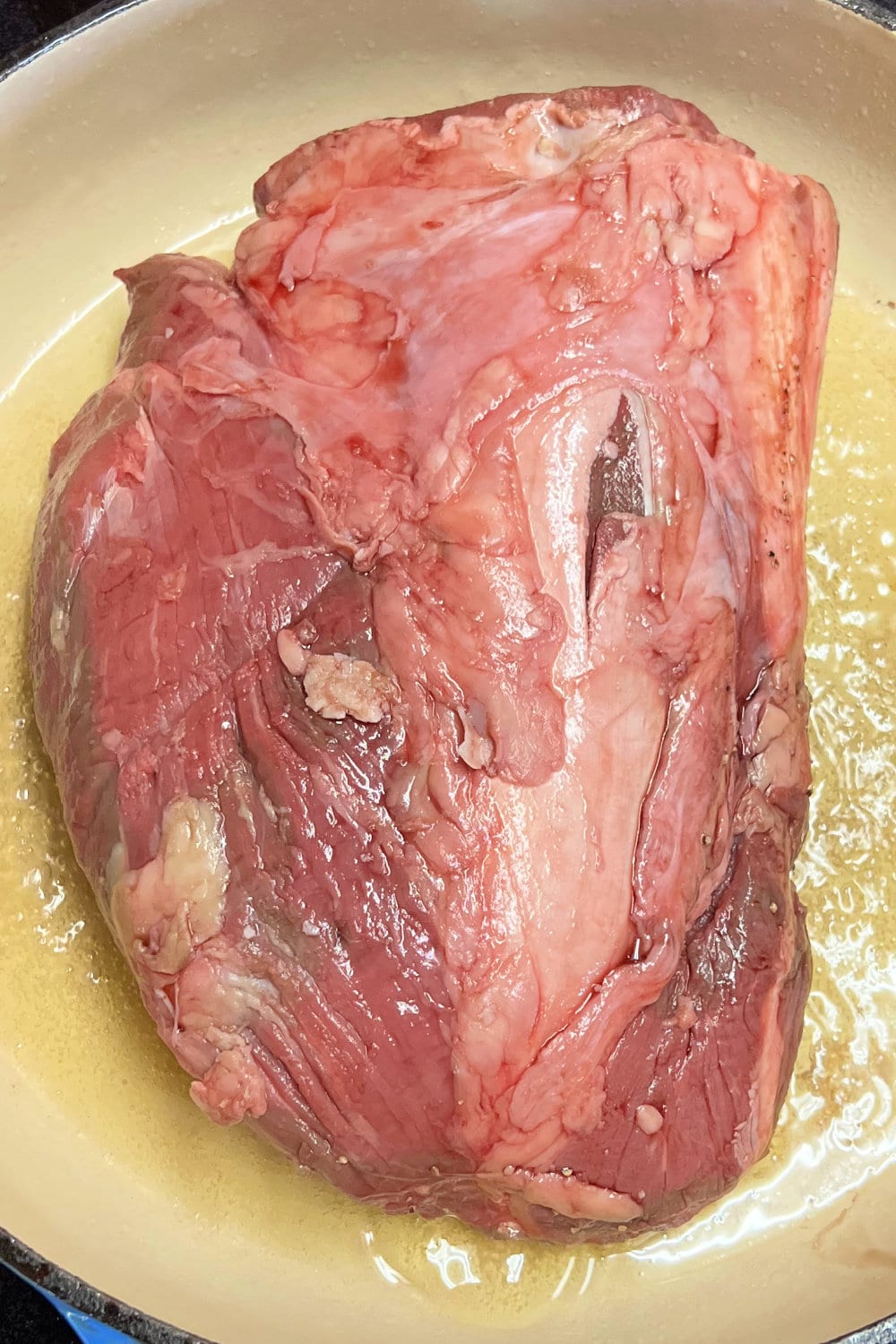
Brown the tenderloin roast for a few minutes on all sides until it is deep golden brown. It will have a nice, crusty exterior.
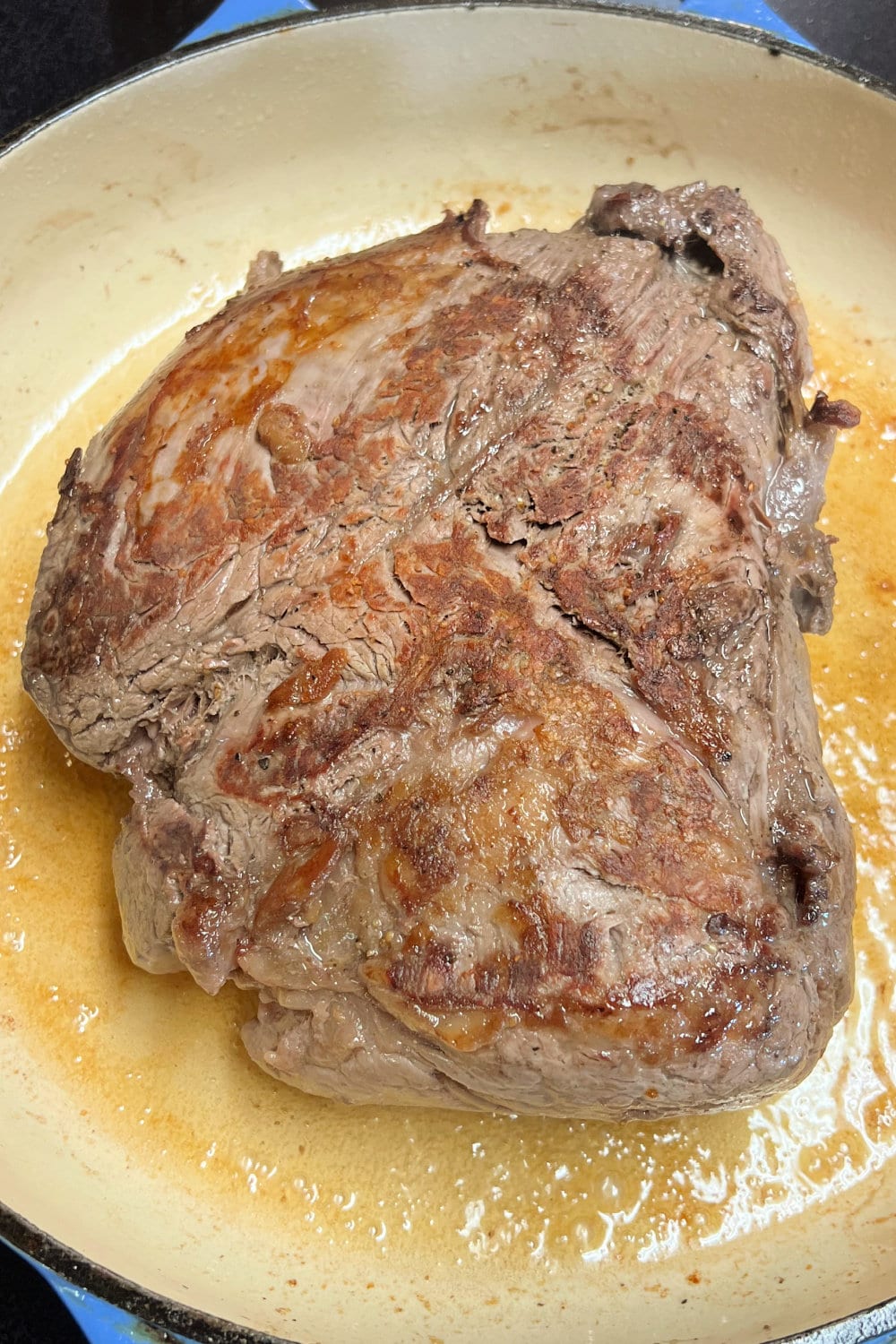
Slather the butter mixture over the top side of the seared beef tenderloin.

If using a programmable instant-read meat thermometer, insert the probe at this point, then place the tenderloin roast into the preheated oven on the center rack.

Program the thermometer to sound when the internal temperature of the roast reaches 125 degrees.

Roast the beef tenderloin for 15-20 minutes until the probe indicates the roast has reached 120-125 degrees F. at the center.
If you are using a non-programmable meat thermometer, now is when you will run it manually. Insert it into the center of the meat to test the internal temperature.

Remove the beef tenderloin from the oven and cover tightly with foil, letting the roast rest for 15-20 minutes, raising the roast temperature to 130-135 degrees for medium rare.
Place the tenderloin roast onto a large cutting board with a channel around the edge. This is where the meat juices will gather.

Carve the beef tenderloin across the grain into thick slices, about 1 – 1 1/2 inches, as desired. Serve with horseradish sauce, if desired.
How much beef tenderloin per person?
I like to figure 10 oz. of raw weight meat per person, which is just over 1/2 lb. per person.
An average 4.5 pound beef tenderloin feeds 7 people generously. Or 6 people with a few leftovers for the cook to enjoy later.
Sauce for beef tenderloin
Several delicious sauce options pair well with beef tenderloin.
Horseradish sauce for beef tenderloin is our favorite. This creamy sauce is perfect for a medium-rare beef tenderloin or prime rib.
Remember, the choice of sauce ultimately depends on your preferences and the flavor profile you want to achieve.
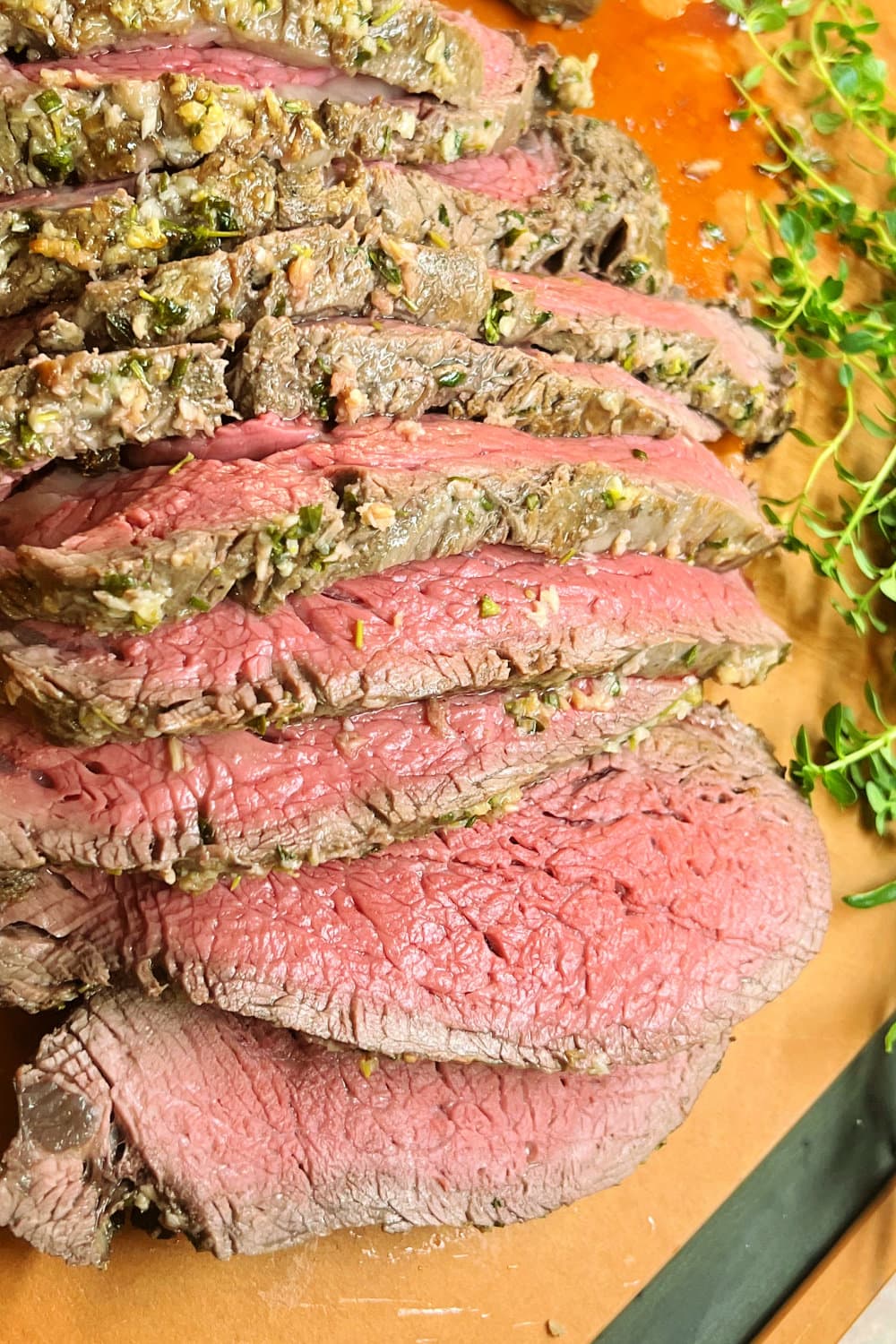
Is beef tenderloin the same thing as filet mignon?
Filet mignons are melt-in-your-mouth steaks that come from the beef tenderloin.
This is where the beef is the most tender. Also known as the tip of the loin.
Butchers cut the remaining beef tenderloin muscle into steaks or use it to create delectable beef tenderloin roasts.
Many people do wonder if beef tenderloin is filet mignon.
In other words, the larger primal cut of meat is beef tenderloin. The individual steaks cut from the tenderloin are referred to as filet mignon.
Beef Tenderloin Vs Filet Mignon
When deciding which to cook, beef tenderloin vs filet mignon, consider the size of the crowd you plan to serve. Also, consider how you would like to cook your beef.
If you are looking for a quicker preparation time over higher heat, the filet mignon may be the best option for a smaller gathering.
Beef tenderloin represents the larger primal cut of meat, whereas filet mignon designates the individual steaks derived from the tenderloin.
How long to cook beef tenderloin per pound
Using this recipe, beef tenderloin should roast about 7-8 minutes per pound at a high temperature.
Remember that the cooking time can vary greatly depending on the roast temperature when you begin the cooking process.
Pulling a beef tenderloin directly from refrigeration and placing it into the oven will take longer for it to cook. It will likely be in the neighborhood of 10-12 minutes per pound.
How to cut beef tenderloin
After the beef tenderloin has had some covered rest following the cooking time, it’s time to slice it.
Lay the tenderloin lengthwise in front of you on a large cutting board. With the grain of the meat running from left to right as you look at it.
Slice ACROSS the meat’s grain into 1-inch slices (or as desired) of steak.
Slicing the tenderloin across the grain shortens the protein fibers of the meat, making it easier to cut and chew.
MEDIUM RARE Tenderloin Temp
Medium-rare temperature is a good starting point for an internal temperature for meat.
We can always add more cooking time to meat to raise the internal temperature from medium rare to medium.
However, if we overcook it initially, we face a significant setback as there is no way to reverse the process.
I like to cook beef tenderloin as a whole roast and only medium rare in doneness.
If I have a guest who prefers meat more done, I can always add a bit of extra cooking time.
You can perform additional cooking by using the microwave on a plate. Or by using a skillet of broth on your stovetop.
I can cook to their preference without overcooking all the rest of the beef.
IS BEEF TENDERLOIN CONSIDERED A ROAST?
Beef tenderloin is considered a roast due to its size.
An average beef tenderloin weighs 4-6 pounds. As a comparison, an average chuck roast weighs 3-4 pounds.
SERVING BEEF TENDERLOIN for a crowd
Beef tenderloin is a great piece of meat to cook when feeding several people.
It’s much easier to cook one big beef tenderloin roast that can be sliced into steaks than to cook individual steaks for each person.
And this is true whether you’re cooking it in the oven or grill!
SHOULD BEEF TENDERLOIN REST BEFORE IT’S COOKED?
Yes, and please don’t skip this step. Giving beef tenderloin adequate beauty rest before you sear is essential. This gives good caramelization and crust all over the roast.
A beef tenderloin that has rested and lost most of the chill of the meat will always take a good sear. This is because it doesn’t cool off the pan or grill when it hits the surface.
This allows the meat to brown so much better. And that adds up to more FLAVOR!
SHOULD BEEF TENDERLOIN REST AFTER IT’S COOKED?
Absolutely! All meat should rest after it cooks, especially big cuts like a beef tenderloin roast.
This is true for three main reasons:
- It allows the internal temperature to rise 10-15 more degrees at the center
- It allows all the protein fibers of the meat to relax so you can slice across them much more easily.
- It lets the juices of the meat redistribute themselves throughout the muscle so the beef is juicy.
HOW TO SEAR BEEF TENDERLOIN
Searing the exterior before roasting it in the oven is essential to give the beef tenderloin a deep, rich flavor and a good crust.
Searing the roast when it is not ice cold from refrigeration makes a difference in how the exterior caramelizes.
Meat brought to room temperature doesn’t cool off the surface of your skillet (or grill) when it hits the pan. This allows the meat to brown and caramelize much better.
DOES IT MATTER WHICH SIDE OF THE TENDERLOIN I SEAR FIRST?
Yes! Sear it fat-side-up to allow the meat side of the roast to go into the hot skillet first.
The side that hits the hot pan first will always have the most beautiful caramelization and presentation.
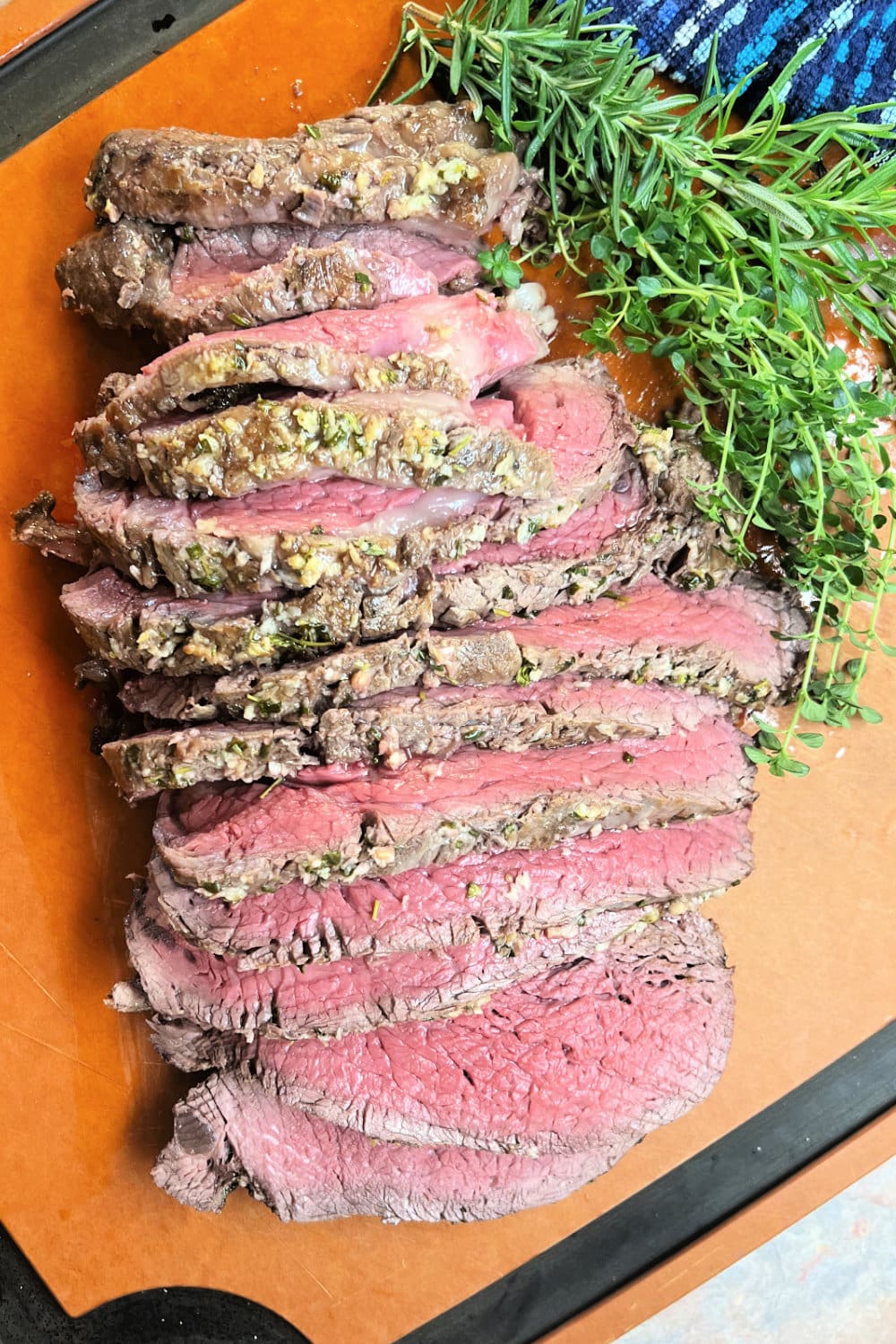
Beef tenderloin vs Prime Rib
Beef tenderloin and prime rib are both very desirable cuts of beef, yet they are distinctly different.
Here are a few comparisons to help you see what each one “brings to the table.”
Steaks: Prime rib is where rib eye steaks come from.
Filet mignon steaks and tenderloin steaks come from beef tenderloin.
Bones and Shape: Prime rib is large and compact with good bones that add flavor.
Beef tenderloin is usually more rectangular (especially if it’s tied for cooking) and has no bones. This makes it super easy to slice for serving.
If you want prime rib without bones, you can ask your butcher to cut them off. This will make slicing the prime rib easier, but then you sacrifice some of the flavors.
Flavor and tenderness: Beef tenderloin is a bit leaner than prime rib but more buttery and tender because of where the cut is located on the cow.
Prime rib has a lot of great marbling throughout the muscle, so it is savory and rich in flavor.
Cost: Beef tenderloin is more expensive than prime rib.
However, because no bones are involved, the entire piece of beef tenderloin can be eaten, making it a good value.
An average 4-5 lb. beef tenderloin will easily serve 8-10 people a nice slice of meat.
Why it’s very important to use a meat thermometer
Using a meat thermometer is important when cooking any meat or poultry.
Instead of cooking meat by minutes per pound or by guesswork, it’s best to cook meat based on the internal temperature.
Is a slice of beef tenderloin like eating a steak?
Sliced beef tenderloin provides an eating experience that is as delicious as eating a steak….except it’s way easier!
Instead of having to manage several smaller pieces of meat (steaks), you can cook or grill a whole beef tenderloin.
Then slice it into slabs of beef that are tender, juicy, and savory.
What to do with leftover beef tenderloin
Beef tenderloin leftovers are rare, but they do happen if you’re lucky.
Use leftover beef tenderloin to make sliders, rolled into wraps, in a salad, or as part of a stew.
Leftover beef tenderloin makes for a sheet-pan nacho platter or loaded skillet fries.
I’ve discovered that people will eat beef tenderloin until it is gone if given the opportunity, so look out!
How do you reheat leftover beef tenderloin slices?
Reheat leftover sliced beef tenderloin for a few seconds in the microwave or slide it into a pan of simmering broth to rewarm.
You can even put a slice or two of beef tenderloin on a hot skillet surface for just a few seconds.
This will make it crisped on the exterior but still buttery and delicate on the inside.
Can you freeze leftover beef tenderloin?
Yes! The beef tenderloin freezes great if wrapped securely in plastic wrap and then popped into a freezer bag.
Beef tenderloin will keep in the freezer for 3-6 months, both cooked or uncooked.
On the rare occasion that you do have some beef tenderloin leftovers,
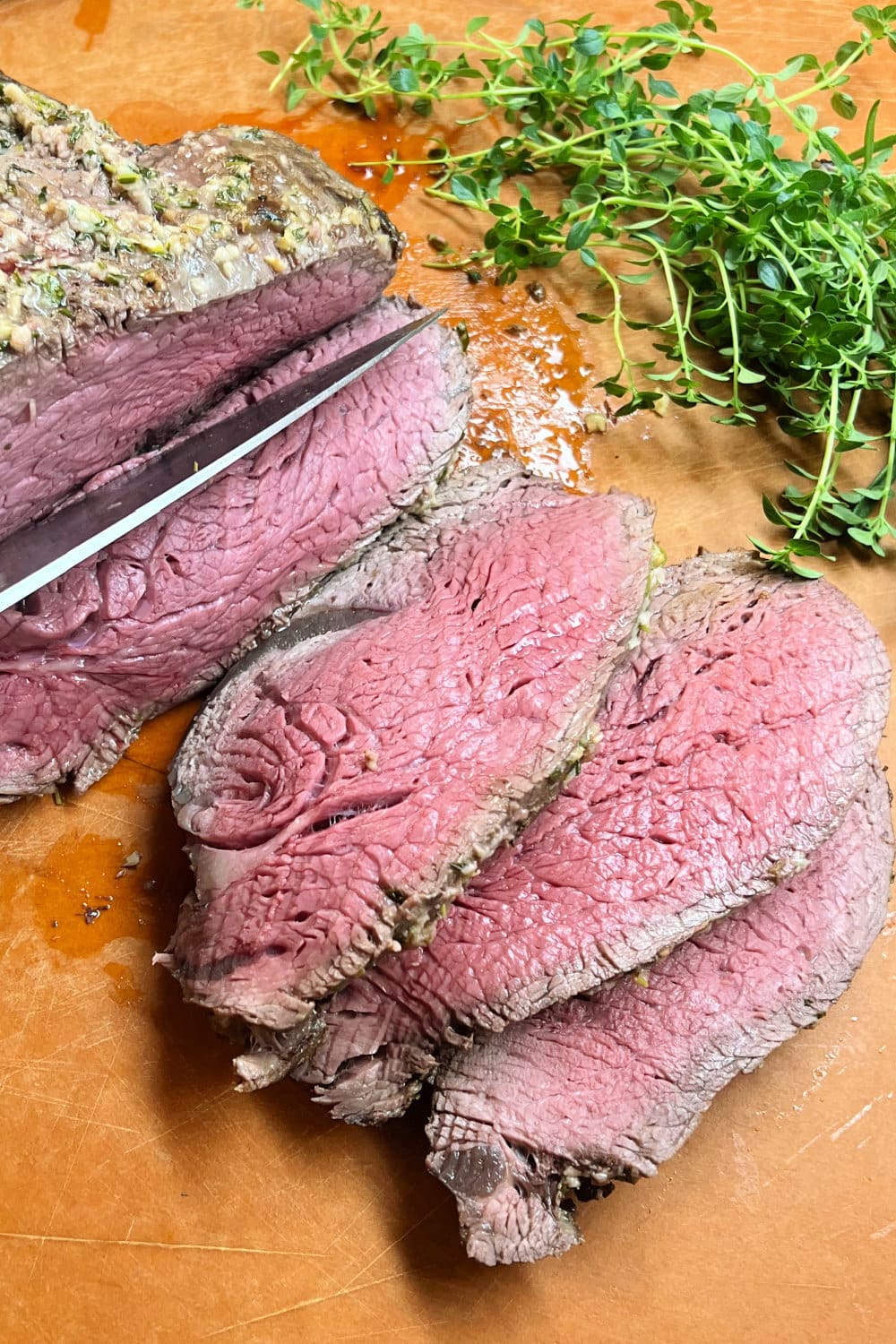
What to serve with beef tenderloin
While beef tenderloin is always the show’s star, consider your sides for beef tenderloin before cooking.
Beef tenderloin pairs well with Creamy Orzo Pasta with Rosemary. Creamy Mashed Potatoes Supreme with French Fried Onions is also quite delicious as a side dish with beef tenderloin.
Baked Yum Yum Potato Wedges have a melted-cheese topping that makes them delicious alongside beef tenderloin.
And if you happen to be a sweet potato fan, you’ll be thrilled to see how yummy Creamy Au Gratin Sweet Potatoes are with any beef dish.
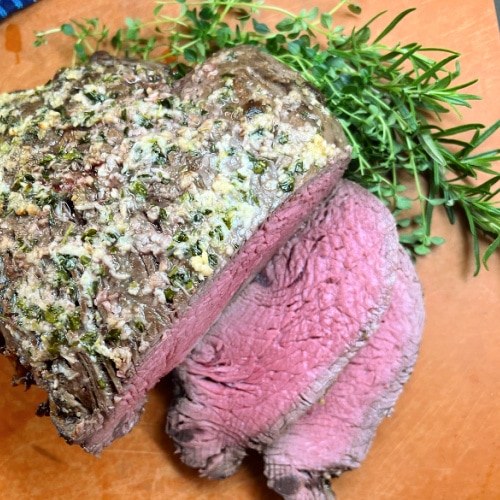
Beef Tenderloin
Ingredients
Beef Tenderloin Roast
- 4 lb. center-cut beef tenderloin roast
- 2 tsp. kosher salt
- 1 tsp. freshly ground black pepper
- 2-3 Tbs. olive oil
Garlic Herb Butter
- 6 Tbs. unsalted butter softened
- 6 cloves garlic minced, may substitute 1 tsp. granulated garlic
- 1 tsp. finely chopped fresh rosemary leaves optional, may substitute 1/4 tsp. dried rosemary leaves
- 1 tsp. finely chopped fresh thyme leaves optional, may substitute 1/4 tsp. dried thyme
Instructions
Prepare the Garlic Herb Butter
- Preheat the oven to 425°F. In a small bowl, mix together the butter and garlic until smooth; fold in fresh herbs if using; reserve.
Prepare the Beef Tenderloin
- Remove the beef tenderloin from the fridge and unwrap. Pat any excess moisture from the exterior of the roast, then season it on all sides with the salt and pepper.
- Let the roast rest, uncovered, on the counter to come to room temperature prior to cooking, 2 – 2 1/2 hours.
- In a large heavy-bottomed skillet (I like to use my 13-inch Lodge cast iron skillet) over medium high heat, add a generous swish of olive oil.
- When the oil is nicely hot and shimmering, place the seasoned tenderloin into the oil, meat-side down (fat-side facing up). Brown the tenderloin roast for a just few quick minutes on all sides until it is deep golden brown with a nice, crusty exterior.
- Slather the prepared butter mixture over the top side of the seared beef tenderloin. If using a programmable instant-read meat thermometer, insert the probe at this point, then place the tenderloin roast (still in the skillet at this point) into the preheated oven on the center oven rack.
- For a medium-rare prime rib, roast the beef tenderloin for 20 minutes, checking the internal temperature at this point to be sure it is on track for reaching 125 degrees F at the center. Continue to roast the tenderloin for an additional 5-10 minutes or so, keeping a close eye on the internal temperature so you don't overcook it. **Keep in mind that if the beef tenderloin rested at room temperature before you seared it and began roasting it, the meat will only need approx. 7-8 minutes per pound of cooking time. Meat cooks much more quickly if it is not ice cold when you begin the initial cooking process.
- Remove the beef tenderloin from the oven and cover tightly with foil, letting the roast rest for 15-20 minutes, allowing the tenderloin to continue to raise in temperature at the center to 130-135 degrees F. for medium rare doneness.
- Uncover the tenderloin and place it onto a large cutting board; carve across the grain into thick slices. Serve with horseradish sauce, if desired.
Nutrition
The post Whole Beef Tenderloin appeared first on Chef Alli.

